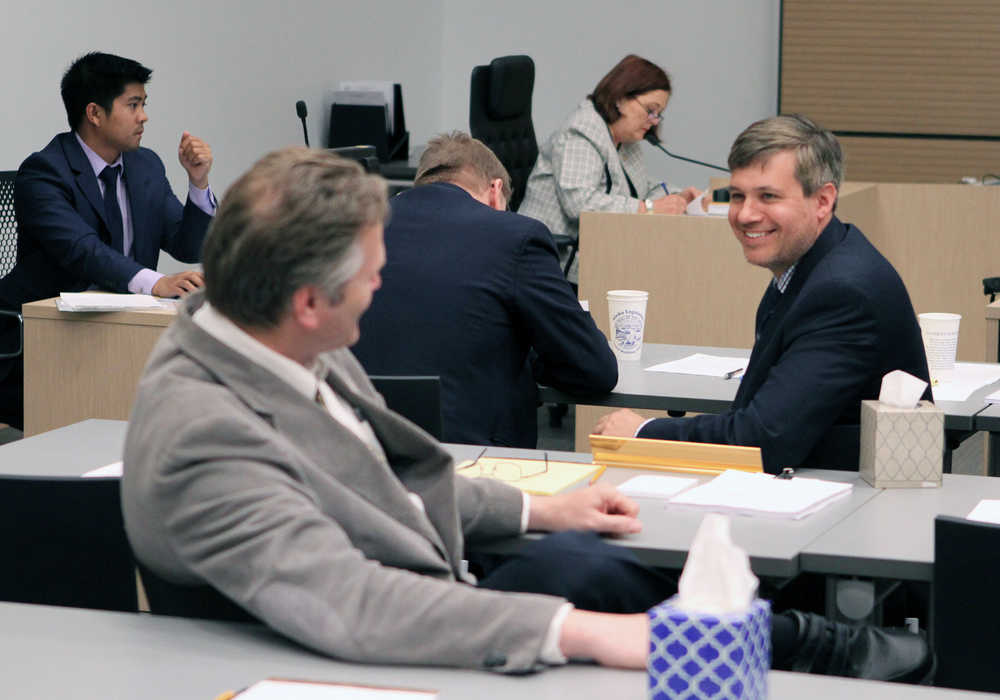ANCHORAGE — After months of negotiations, the Alaska Legislature on Thursday approved a $5 billion budget that reduces spending while tapping the state’s reserves to help with multibillion-dollar deficits brought on by low oil prices.
The plan now goes to Gov. Bill Walker, whose administration had been preparing for a partial government shutdown next month in case a fully funded budget isn’t reached.
During a news conference Thursday afternoon, Walker said state workers who had been notified they could be laid off will get better letters “advising them the layoff notices have been rescinded.” Those are set to go out Friday.
Walker also expressed disappointment lawmakers didn’t take up Medicaid expansion, which is a priority of his administration.
“We’ll evaluate all options and see what makes sense,” Walker said when asked if he would call a special session on expansion.
Lawmakers passed the budget in their second special session of 2015, with negotiated raises for union workers a sticking point in their talks. The sessions have lasted eight weeks past this year’s regular 90-day session. The House voted 32-7 for the budget with a handful of Democrats and one Republican, Rep. Lora Reinbold, R-Eagle River, voting no. The Senate vote was 16-3, with three Democrats dissenting.
Lawmakers voted to draw money from a giant state savings account, the constitutional budget reserve, to cover the difference between projected revenue and spending. That required three-fourths approval by both chambers, and minority Democrats used the requirement as leverage to restore some proposed cuts.
Sen. Pete Kelly, R-Fairbanks, said in an announcement after the vote that the budget reduces spending by $800 million, or $1,086 for every Alaskan. He said government had to shrink.
“Government has had a good run, but circumstances have changed,” Kelly said.
State Sen. Bill Wielechowski, D-Anchorage, voted no. He noted education will take a $32.5 million hit, while lawmakers left intact Alaska’s millions of dollars in tax credits for the oil industry.
Reinbold, who was booted from the majority for not supporting an earlier version of the budget, maintained her objections and said not enough was done to reduce spending.
She said federal government requirements in education standards are costing the state millions, and the University of Alaska could be doing more to develop its land holdings to become more self-sufficient.
Walker’s administration has been making plans for a partial government shutdown if a fully funded budget isn’t passed by July 1, including mailing layoff warnings to about 10,000 state employees.
The compromise asks the governor to not negotiate raises in the future, but does allow for negotiations to reopen if oil goes above $95 a barrel or below $45 a barrel.
The budget has been the top issue in the Legislature as lawmakers struggled to agree on a spending plan in the face of a dramatic fall in oil prices. When the legislative session ended in 2014, the price of Alaska oil was about $107 per barrel. On Tuesday, the price was $65.
Alaska general fund spending is upward of 90 percent dependent on revenue from the petroleum industry.
The compromise will allow elderly Alaskans more money for medicine and other expenses and allow children to have a “better chance for a fair shake.”
Rep. Bryce Edgmon, D-Dillingham, said future budgets will have to look at the other side of the financial ledger: additional revenue.
“I do not know a way that we can cut our way to a balanced budget,” Edgmon said.
Both chambers adjourned later Thursday after passing a bill known as Erin’s Law. The measure requires school districts to give students information about sexual abuse and dating violence. The bill is named for a survivor of child sexual abuse, Erin Merryn, who hopes to see the law passed in all 50 states.
The measure would require school districts to develop and implement age-appropriate sexual abuse and assault awareness and prevention education. Twenty-one states have enacted a version.

